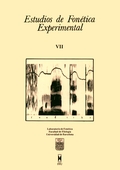La invariación acústica en las oclusivas sordas del castellano. Estudio perceptivo
Abstract
In this paper we tried to find out whether breve consonant-vowel stimuli give sufficient acoustic cues for place of articulation in Spanish unvoiced stops. With this aim, we synthesized a series of short-duration syllables (10, 20, 29 and 46 ms), which were subsequently manipulated removing vowel transitions in experiments 1 and 4 and transitions as well as the initial burst in experiment 2. This allowed us to test the importance of this parameters on speech perception. The resulting stimuli were randomized and presented to subjects for identification. The results we obtained, although not as encouraging as those obtained by Blurnstein and Stevens (1980), provided us with the evidence we needed to support the validity of the initial hypothesis, i.e., that brief stimuli were reliable for the listeners to identify [p], [t] and [k] and that they also contained sufficient information for vowel identification.
Published
How to Cite
Issue
Section
License

This work is licensed under a Creative Commons Attribution-NonCommercial-NoDerivatives 4.0 International License.
All articles published online by Estudios de Fonética Experimental are licensed under Creative Commons Attribution-NonCommercial-NoDerivs 4.0 International (CC BY-NC-ND 4.0 DEED), unless otherwise noted. Estudios de Fonética Experimental is an open access journal. Estudios de Fonética Experimental is hosted by RCUB (Revistes Científiques de la Universitat de Barcelona), powered by Open Journal Systems (OJS) software. The copyright is not transferred to the journal: authors hold the copyright and publishing rights without restrictions. The author is free to use and distribute pre and post-prints versions of his/her article. However, preprint versions are regarded as a work-in-progress version used as internal communication with the authors, and we prefer to share postprint versions.




